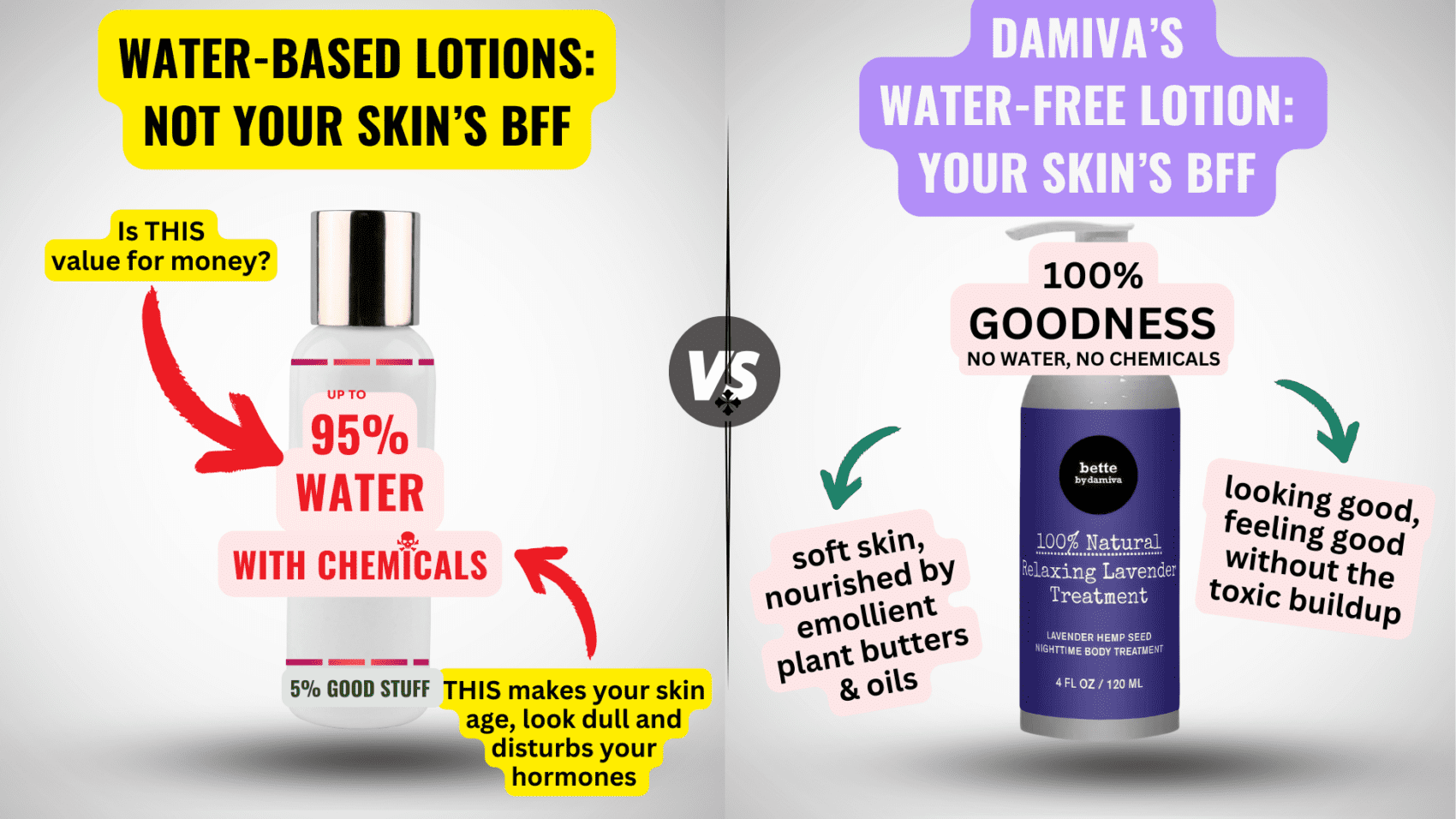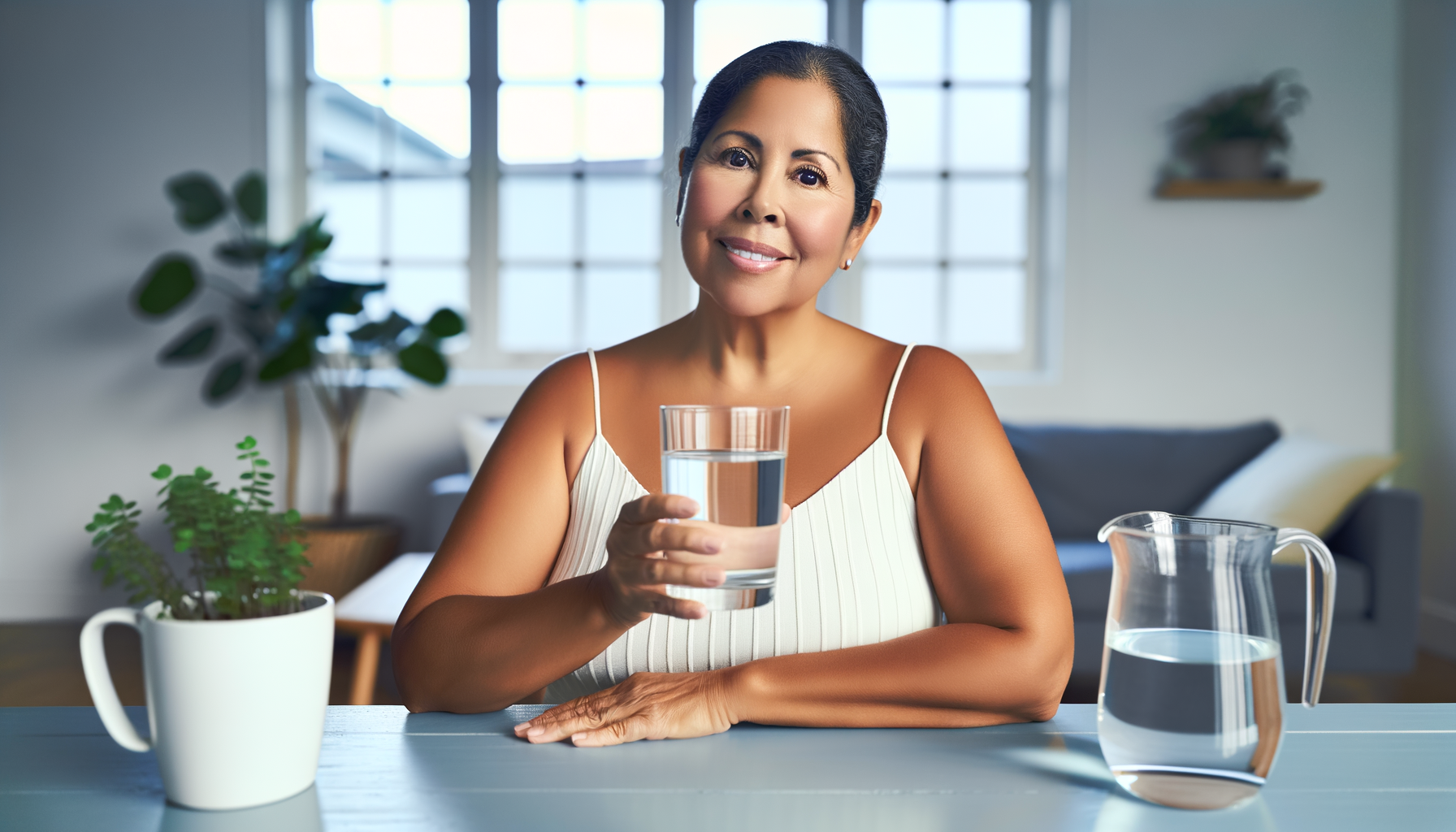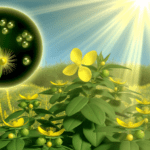Hydration and Menopause
The menopausal transition, often referred to as perimenopause, is a significant period in a woman’s life characterized by the end of reproductive capability and marked hormonal changes, particularly in estrogen and progesterone levels. This phase can lead to a variety of physiological and psychological symptoms, including hot flushes, night sweats, mood swings, and cognitive changes. As the body adapts to fluctuating hormone levels, maintaining proper hydration becomes increasingly important to mitigate these symptoms and support overall health.
The Role of Water in Women’s Health
Water is a critical component of health, especially for women undergoing menopause. It constitutes a significant portion of the human body and is essential for various bodily functions, including joint lubrication, skin elasticity, mood regulation, cognitive function, and digestive health. During menopause, the decrease in estrogen levels can impair the body’s ability to retain water, leading to an increased risk of dehydration. Adequate water intake can help manage menopausal symptoms by maintaining hydration levels, supporting bodily functions, and potentially reducing the severity of symptoms such as hot flushes, headaches, and urinary tract infections.
Common Misconceptions About Hydration
Despite the importance of hydration, there are several misconceptions that can hinder proper water intake. One common belief is that all fluids contribute equally to hydration. However, beverages like tea, coffee, alcohol, and sugary drinks can actually lead to further dehydration. Another misconception is that one should only drink water when thirsty. Thirst is often a late indicator of dehydration, and regular water intake throughout the day is necessary to prevent dehydration. Additionally, some people may avoid drinking water to reduce the frequency of urination, not realizing that concentrated urine from insufficient water intake can irritate the bladder and exacerbate menopausal symptoms.
Understanding these misconceptions is crucial for adopting healthy hydration habits during menopause. By recognizing the importance of water and dispelling myths about hydration, women can better navigate the menopausal transition and improve their quality of life.
Physiological Impact of Dehydration During Menopause
Joint Health and Inflammation
Dehydration can significantly exacerbate joint pain and inflammation, which are already common complaints during menopause. The synovial fluid that lubricates joints requires adequate hydration to maintain its viscosity and cushioning properties. When dehydrated, this fluid is less effective, leading to increased friction, inflammation, and discomfort in the joints. Ensuring proper hydration can help maintain joint health and reduce the severity of inflammation and associated pain.
Skin Elasticity and Appearance
The skin is often described as a reflection of overall health, and its appearance can be dramatically affected by hydration levels. During menopause, the skin’s ability to retain moisture diminishes, often leading to dryness and a loss of elasticity. Proper hydration can plump up skin cells, reducing the appearance of fine lines and wrinkles, and imparting a more youthful, radiant complexion. Hydrated skin also has a stronger barrier function, which is crucial for protecting against environmental stressors.
Mood Swings and Mental Health
Mood swings are a hallmark of menopause, and dehydration can further influence emotional well-being. Dehydration has been linked to increased irritability and stress, which can compound the mood instability associated with hormonal fluctuations. By staying hydrated, women may experience more stable moods and better manage the emotional rollercoaster often associated with this life stage.
Cognitive Function and Memory
Cognitive function, including memory and concentration, can be negatively impacted by both menopause and dehydration. The brain relies heavily on adequate fluid balance to function optimally. Even mild dehydration can lead to difficulties in focusing, memory lapses, and a general sense of mental fog. Maintaining hydration is essential for supporting cognitive health and mitigating the cognitive challenges that can accompany menopause.
Digestive System and Gut Health
Hydration plays a critical role in maintaining a healthy digestive system. Adequate water intake ensures proper digestion and nutrient absorption, and helps prevent constipation, a common issue during menopause. Furthermore, a well-hydrated body supports a balanced gut microbiome, which is vital for overall health. Regular water consumption can promote digestive regularity and contribute to a healthier gut environment.
In conclusion, the physiological impact of dehydration during menopause is far-reaching, affecting everything from joint health to mental acuity. Recognizing the importance of hydration is a key step in managing menopausal symptoms and maintaining overall health during this transitional period.

THEN IT CONTAINS TOXIC CHEMICALS. WHY RISK IT GETTING SICK? GO CHEMICAL FREE.
Symptom-Specific Benefits of Increased Water Intake
Alleviating Hot Flashes and Night Sweats
One of the most common symptoms of menopause are hot flushes and night sweats, which can lead to significant discomfort and sleep disturbances. Staying well-hydrated can help regulate body temperature and reduce the severity of these episodes. When the body is dehydrated, it can exacerbate the frequency and intensity of hot flushes. By maintaining adequate water intake, women can help minimize these uncomfortable symptoms and improve their overall sense of well-being during menopause.
Reducing Headaches and Migraines
Headaches and migraines are often reported to increase during menopause. Dehydration is a known trigger for headaches, and with the hormonal changes affecting hydration levels, it becomes crucial to drink more water. Proper hydration can help reduce the onset of headaches and may also lessen their intensity. By ensuring a consistent water intake, women can potentially experience fewer headaches and better manage this menopausal symptom.
Combatting Fatigue and Energy Slumps
Many women going through menopause report feelings of fatigue and a lack of energy. Water plays a vital role in cellular function and energy production. Increased water consumption can help combat fatigue by aiding in the body’s metabolic processes and improving cellular hydration. This can lead to enhanced energy levels and a reduction in the overall feeling of lethargy that often accompanies menopause.
Preventing Urinary Tract Infections
Menopausal changes can make women more susceptible to urinary tract infections (UTIs). Drinking more water helps flush out the urinary system, reducing the risk of infection. Adequate hydration dilutes the urine and frequent urination can help to move bacteria out of the bladder before an infection can begin. Thus, a higher water intake is a simple yet effective strategy for preventing UTIs during menopause.
Managing Night Palpitations
Night palpitations can be a distressing symptom of menopause, often linked to hormonal fluctuations and dehydration. Proper hydration is essential for maintaining electrolyte balance, which in turn supports heart health. By drinking sufficient water, women can help stabilize their heart rate and reduce the occurrence of night palpitations. This can lead to more restful sleep and a better quality of life during the menopausal transition.
In conclusion, water is a powerful ally in managing menopausal symptoms. It is a simple, non-pharmacological approach that can offer relief from some of the most challenging aspects of this life stage. By understanding the importance of hydration, women can take proactive steps to improve their menopause experience.

Challenges and Solutions to Drinking More Water
Overcoming Taste Preferences
One common challenge to increasing water intake is the preference for flavored beverages over plain water. To overcome this, consider gradually infusing your water with natural flavors such as slices of fruits, cucumber, or herbs like mint. This can make the transition to drinking more water more enjoyable without adding sugars or artificial sweeteners that negate hydration benefits. Additionally, using a water filter can improve the taste of tap water, making it more palatable.
Integrating Water Intake into Daily Routine
Incorporating water consumption into your daily routine can be a game-changer. Start by drinking a glass of water first thing in the morning to kickstart your metabolism. Keep a reusable water bottle with you throughout the day, and take sips regularly. If you work at a desk, set a reminder to drink water every hour. For those who find it challenging to remember, there are apps available that can help track your intake and remind you to hydrate.
Choosing the Right Type of Water
The type of water you drink can also influence your hydration levels. While tap water is the most accessible, some may prefer the taste and additional minerals found in spring water. It’s important to ensure that the water you choose is free from contaminants and, if possible, contains a natural balance of electrolytes. However, be wary of waters with added sugars or flavors that can be counterproductive to your hydration goals.
Gradually Increasing Water Consumption
For those not used to drinking large amounts of water, it’s essential to increase intake gradually. Sudden increases can lead to frequent trips to the bathroom, which can be discouraging. Start by adding an extra glass of water to your day and slowly build up to the recommended intake. This allows your body to adjust and can help make drinking water a more ingrained habit.
Practical Tips:
- Use a marked water bottle to visualize your progress.
- Flavor your water with natural ingredients.
- Set regular reminders to take sips of water.
- Pair drinking water with daily activities, such as before meals or during breaks.
- Listen to your body and adjust your intake if you’re active or in hot climates.
By addressing these challenges with practical solutions, you can significantly improve your water intake, leading to better health and alleviation of menopausal symptoms.
Practical Tips for Enhancing Water Intake
Starting the Day with Water
Beginning your day with a glass of water is a simple yet powerful habit. It kickstarts your metabolism and hydrates your body after a night’s rest. Opt for a warm glass of water to gently wake your system and prepare it for the day ahead. This practice not only supports your digestive system but also sets a positive tone for making healthy choices throughout the day.
Strategies for Consistent Hydration Throughout the Day
Maintaining hydration isn’t just about the amount of water you drink, but also the consistency of your intake. Here are some strategies to keep you on track:
- **Keep a water bottle handy**: Whether you’re at work or running errands, having a water bottle within reach serves as a visual reminder to take sips regularly.
- **Drink water before each meal**: This not only helps with hydration but can also aid in digestion and prevent overeating.
- **Use technology**: Set reminders on your phone or use a hydration tracking app to prompt you to drink water at regular intervals.
- **Infuse flavor**: If plain water doesn’t appeal to you, add slices of fruits or herbs to enhance the taste naturally.
Setting Realistic Hydration Goals
It’s important to set achievable goals for your water intake. A general guideline is to drink around 1.5 to 2 liters of water daily, but this can vary based on individual needs and lifestyle factors. Start by gradually increasing your intake and listen to your body’s signals. Remember, the goal is to feel good and improve your health, not to meet an arbitrary number.
Monitoring Progress and Adjusting Habits
Keep track of your water consumption and observe how your body responds. Notice changes in your skin, energy levels, and overall well-being. If you find yourself frequently visiting the restroom, adjust your intake accordingly. It’s about finding the right balance that works for you. Celebrate small victories and make adjustments as needed to ensure that your hydration habits are sustainable and beneficial.
By incorporating these practical tips into your daily routine, you can enhance your water intake and support your body through the menopausal transition. Remember, hydration is a key component of your overall health and can significantly impact the severity of menopausal symptoms. So, raise a glass to your health and make water consumption a priority!
By the way, something for you, a little gift!!!
I am just in the middle of publishing my book. It’s about How women can balance their hormones. One part is about food and diet, of course.
Follow this link and enter your email.
I will send you this part of the book for free once the book is published. It has many concrete, practical tips and recipes and will help you feel better during menopause or times of Big hormonal fluctuations.
Annette, Damiva Lead for Health & Wellness

Alternative Hydration Options and Considerations
Role of Foods with High Water Content
During menopause, staying hydrated isn’t limited to just drinking water. Consuming foods with high water content can significantly contribute to your hydration levels. Fruits and vegetables such as cucumbers, celery, watermelon, strawberries, and lettuce are over 90% water and can be a refreshing way to maintain fluid balance. Integrating these hydrating foods into your diet not only helps with water intake but also provides essential vitamins and minerals that support overall health during menopause.
Herbal Teas and Their Hydrating Properties
Herbal teas are a wonderful alternative to plain water and can offer additional benefits. Unlike caffeinated teas, herbal varieties do not have a diuretic effect, meaning they can help maintain hydration levels. Options like chamomile, peppermint, and hibiscus are not only hydrating but can also have a calming effect, which may be beneficial for managing menopausal symptoms such as mood swings and sleep disturbances. Enjoying these teas hot or cold can add variety to your fluid intake.
Understanding the Impact of Caffeine and Alcohol
It’s important to be mindful of the beverages that can contribute to dehydration. Caffeine and alcohol have diuretic properties, which can lead to increased fluid loss. During menopause, it may be wise to limit intake of these beverages, especially if you’re experiencing symptoms like hot flashes or night sweats that already predispose you to fluid loss. If you do consume these drinks, compensate by increasing your water intake to maintain proper hydration.
When to Opt for Electrolyte-Enhanced Drinks
Electrolyte-enhanced drinks can be beneficial during menopause, especially if you’re experiencing excessive sweating due to hot flashes or engaging in physical activity. These beverages help replenish sodium, potassium, and other key electrolytes lost through sweat. However, it’s crucial to choose options without added sugars or artificial flavors. Electrolyte drinks should be consumed in moderation and as part of a balanced approach to hydration that primarily focuses on water and hydrating foods.
Remember, while alternative hydration options can be helpful, they should complement, not replace, your daily water intake. Aim for a balanced hydration strategy that includes plenty of water, hydrating foods, and mindful consumption of other beverages.
Conclusion and Encouragement for Habit Change
Summarizing the Importance of Hydration
Throughout this article, we have explored the multifaceted benefits of maintaining adequate hydration, particularly during the menopausal transition. Water is not merely a thirst quencher; it is a vital component for overall health and well-being. During menopause, the physiological changes women experience can be mitigated by proper hydration. From maintaining joint health and skin elasticity to supporting cognitive function and mood, water intake is crucial. It also plays a significant role in alleviating specific menopausal symptoms such as hot flushes, headaches, and urinary tract infections. The evidence is clear: drinking more water is a simple yet powerful tool for navigating the complexities of menopause.
Encouraging Personal Experimentation
Every woman’s menopausal journey is unique, and there is no one-size-fits-all solution. Therefore, we encourage personal experimentation with hydration levels. Start by gradually increasing your water intake and observe how your body responds. Keep a hydration diary to track your consumption and note any changes in symptoms or overall health. Listen to your body’s signals and adjust accordingly. Remember, the goal is not just to drink more water, but to find the balance that works best for you.
Invitation for Feedback and Shared Experiences
We invite you to share your experiences with hydration during menopause. Your stories can provide invaluable insights and support to others on a similar path. Whether you’ve found relief from symptoms through increased water intake or discovered creative ways to integrate hydration into your daily routine, your feedback can inspire and guide fellow readers. Together, we can build a community of knowledge and encouragement, empowering each other to make positive lifestyle changes during menopause.
In conclusion, embracing hydration as a habit change during menopause is not just about managing symptoms—it’s about enhancing quality of life. We hope this article has illuminated the importance of water for your health and inspired you to prioritize hydration. As you adjust your habits and experiment with what works for you, remember that small steps can lead to significant improvements. Stay hydrated, stay informed, and let’s continue the conversation about thriving during menopause.









